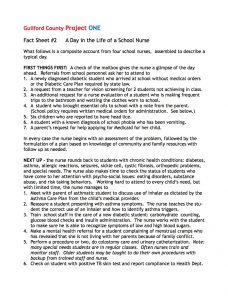What follows is a composite account from four school nurses, assembled to describe a typical day.
FIRST THINGS FIRST: A check of the mailbox gives the nurse a glimpse of the day ahead. Referrals from school personnel ask her to attend to
- A newly diagnosed diabetic student who arrived at school without medical orders or the Diabetic Care Plan required by state law.
- A request from a teacher for vision screening for 2 students not achieving in class.
- An additional request for a nurse evaluation of a student who is making frequent trips to the bathroom and wetting the clothes worn to school.
- A student who brought essential oils to school with a note from the parent. (School policy requires written medical orders for administration. See below.)
- Six children who are reported to have head lice.
- A student with a known diagnosis of school phobia who has been vomiting.
- A parent’s request for help applying for Medicaid for her child.
In every case the nurse begins with an assessment of the problem, followed by the formulation of a plan based on knowledge of community and family resources with follow up as needed.
NEXT UP – the nurse rounds back to students with chronic health conditions: diabetes, asthma, allergic reactions, seizures, sickle cell, cystic fibrosis, orthopedic problems, and special needs. The nurse also makes time to check the status of students who have come to her attention with psycho-social issues: eating disorders, substance abuse, and risk taking behaviors. Working hard to attend to every child’s need, but with limited time, the nurse manages to:
- Meet with parent of asthmatic student to discuss use of inhaler as dictated by the Asthma Care Plan from the child’s medical provider.
- Reassure a student presenting with asthma symptoms. The nurse teaches the student the correct use of an inhaler and how to identify asthma triggers.
- Train school staff in the care of a new diabetic student: carbohydrate counting, glucose blood checks and insulin administration. The nurse works with the student to make sure he is able to recognize symptoms of low and high blood sugars.
- Make a mental health referral for a student complaining of menstrual cramps who has revealed that she is not living with her parents because of family conflict.
- Perform a procedure or two, do colostomy care and urinary catheterization. Note: many special needs students are in regular classes. Often nurses train and monitor staff. Older students may be taught to do their own procedures with backup from trained staff and nurse.
- Check on student with positive TB skin test and report compliance to Health Dept.
STILL “TO DO” AND NEVER NEGLECTED: Medication Administration. *Only those medications having written medical orders are administered at school. The nurse:
- Reviews medication administration logs of all medications given by trained school staff.
- Monitors students receiving medication for effectiveness as well as side effects.
STOPPING FOR EMERGENCIES AS THEY OCCUR: Falls, cuts & scratches, fevers, vomiting and diarrhea, seizures, asthma attacks -the list includes everything that can affect a child.
AND YET STILL MORE, as the day and time allow
Screenings:
- Vision Screening for 4 first and fourth grade classes with written referrals home for students who fail the screen as well for those with lost or broken glasses.
- Individual dental assessments when dental disease is suspected.
Finding a source of dental or vision care can be difficult. Nurses use every resource available to get beyond barriers to care such as lack of transportation or lack of a payment source.
Immunizations/Communicable Disease/Health Promotion
The nurse:
- Reviews required immunizations and health assessments for kindergarten students as required by law. Contacts parents of students not in compliance and follows until compliance achieved.
- Conducts ongoing review of immunization records of new students,
- Maintains record of students exempted from any required immunization for any reason.
Teaching/health education/Special Needs Team Member
The nurse may:
- Collaborate with school social worker on a program on hygiene and bullying.
- Work with small parent group (family diabetic support group).
- Teach staff on how to manage emergency procedures.
- Meet with pregnant students, checking to be sure they are receiving appropriate prenatal and general primary care,
- Provide information to school based team for student IEP’s and communicate to medical providers how the child is doing in school.
Good health is necessary for academic success and nurses make good health happen.
